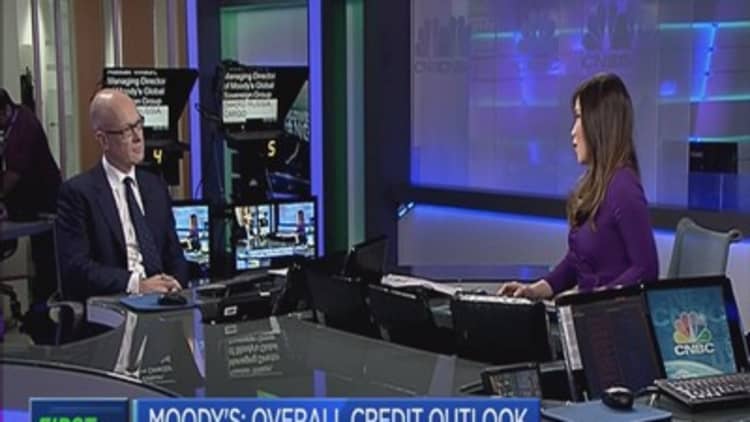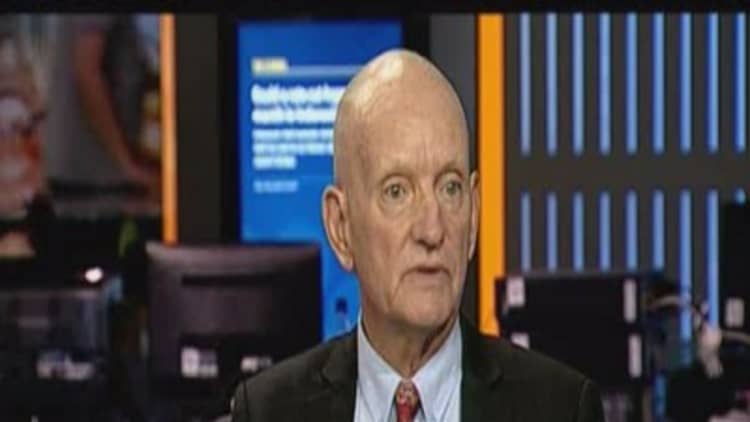
Volatile capital flows, lower-than-expected growth in China and the eventual tightening of U.S. monetary policy are the major risks threatening sovereign credit ratings, the Moody's Investors Service warned on Wednesday.
Going into 2016, our credit outlook for global sovereigns is stable overall, but there is more scope for negative surprises than for positive ones," Alastair Wilson, managing director of global sovereign risk at Moody's, said in a report out Wednesday.
Last month, the International Monetary Fund (IMF) cut its 2016 outlook for global growth to 3.6 percent from 3.8 percent, which it forecast in July. The body warned that "downside" risks to the world economy had grown in recent months.
The proportion of Moody's-rated countries with a stable outlook has fallen slightly from a year ago (to 75 percent from almost 80 percent) and the share of negative outlooks has risen.
CNBC takes a closer look at some of the factors that could threaten the world economy next year.
Capital flow volatility
Wilson of Moody's told CNBC that ongoing volatility in capital flows around the world was probably the greatest risk for 2016.
"We are seeing very jittery markets; we are seeing capital flows reversing — big shifts in capital flows — driven by things that should not matter. The Chinese stock market crash, for example, should have no implications for global growth in itself, but of course it caused huge shifts in capital flows," he told CNBC on Wednesday.
"The unpredictability of those flows and what it might mean for the more exposed sovereigns around the world — and they are dotted around the world — is probably the most concerning."
Capital outflows from China topped $500 billion in the first eight months of the year, peaking at around $200 billion in August, the U.S. Treasury reported last month.
The peak in outflows followed a slump in the Chinese stock market that rocked global stocks and began with Beijing's announcement that the state was stepping back from its role in setting foreign exchange rates.
"There has been a lot of talk recently about the implications for global growth of capital markets flows and the potential that gives for financial or economic instability. We see those as broad risks," Wilson told CNBC.
China slowdown
Lower-than-expected growth in China would pose a danger for the world economy, Moody's said in its report on Wednesday. It forecasts the world's second-largest economy will grow by 6.3 percent in 2016, down from just under 7 percent in 2015 and a peak of 14.2 percent in 2007.
As a massive consumer of commodities, China's slowdown has already contributed to the slump in energy and metal prices. This has undermined growth in commodity-producing countries, leaving them more susceptible to further financial or economic shocks — such as disappointing China growth — Moody's warned.
Multinationals and industries with strong ties to China are also feeling the strain.
Container shipping behemoth, Maersk Line, announced plans on Wednesday to slash its workforce by almost a fifth and pull out of vessel orders due to slowing trade between China and Europe.
Big miners have also taken a hit, with Glencore and Antofagasta among those announcing large-scale job and/or output cuts.
The 12-month annualized return for the S&P Metals and Mining Select Industry Index has plummeted by nearly 50 percent.
Fed rate hike
Global markets are on tenterhooks waiting for when Federal Reserve Chair Janet Yellen will finally hike U.S. interest rates from record lows.
"Events such as the eventual tightening of U.S. monetary policy may lead to potential shocks that would reverberate globally, should they affect capital flows and investor sentiment," Wilson said in the Moody's report.
Meanwhile, bets are on that the European Central Bank (ECB) will expand the length or scope of its 1 trillion euro ($1.1 trillion) asset-buying program before the end of the year.
This divergence in monetary policy between the Fed and other major central banks, such as the ECB, favors the U.S. dollar, said BBH analysts led by Marc Chandler in a note on Wednesday.
Again, this comes with risks for the global economy, the IMF warned in October.
"A further appreciation of the U.S. dollar could pose balance sheet and funding risks for dollar debtors, especially in some emerging market economies, where foreign-currency corporate debt has increased substantially over the past few years," it reported.
The dollar has strengthened a little less than 8 percent against a basket of currencies this year.

Geopolitical disturbance
Moody's also warned on Wednesday that geopolitical risks remained an underlying threat to sovereign credit ratings in 2016, particularly in the Middle East and Greece.
The Middle East has been destabilized by the rise in terrorist groups such as the Islamic State (ISIS) and Syria has seen a descent into near-civil war as a result. Refugees are flooding into Southern and Eastern Europe, particularly Greece, and policymakers are yet to produce a coherent solution to the crisis.
So far, after making the dangerous journey across the Mediterranean Sea, according to the United Nations refugee agency. Around 80 percent of these travelers have landed in Greece, worsening economic and social pressures in a country still grappling with massive debts and recession.
— By CNBC's Katy Barnato. Follow her on Twitter @KatyBarnato.

